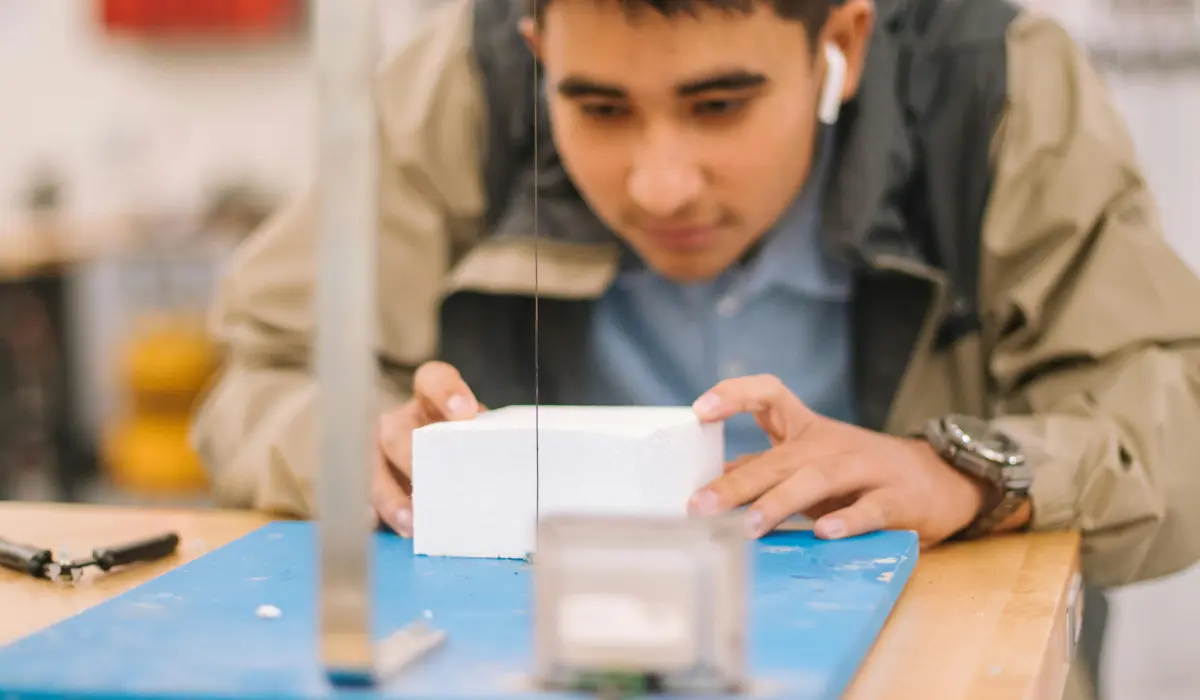Intermediate Engineering Studies in Pakistan, known as FSc Pre-Engineering, is a popular academic track designed for students with a strong interest in engineering, technology, and the applied sciences.
This program establishes a solid foundation in key subjects like mathematics, physics, and chemistry, preparing students for advanced studies and specialized careers.

This guide provides a detailed overview of the eligibility requirements, core subjects, career pathways, and prospects for students pursuing Intermediate in Pre-Engineering in Pakistan.
Eligibility Criteria for FSc Pre-Engineering in Pakistan
To enroll in the Pre-Engineering track, students need to meet certain eligibility requirements, typically including:
- Completion of Matriculation (Grade 10) with a focus on science subjects such as Mathematics, Physics, and Chemistry.
- Minimum Grade Requirements: Most institutions require students to have at least a B grade (or approximately 60-70%) in their Matriculation exams, though requirements vary by college.
- Admission Tests (if applicable): Select colleges may conduct entry tests or interviews to assess a student’s preparedness for the rigorous program. To gain admission into many of Pakistan’s engineering colleges, students must also pass the ECAT test—a standardized entrance exam essential for those pursuing a career in engineering. For a deeper understanding of the ECAT test, its structure, and preparation tips, visit our detailed ECAT test guide.
- Pakistan’s Educational Boards – Link to Pakistan Board of Intermediate and Secondary Education pages for various regions for detailed requirements: BISE Lahore.
Meeting these criteria ensures students are equipped for the challenging nature of Pre-Engineering, which demands analytical and problem-solving skills.
Total Marks for the FSc Pre-Engineering Program
The Pre-Engineering program spans two years, with an aggregate of 1100 marks:
- First Year (Part 1): 550 marks
- Second Year (Part 2): 550 marks
This total includes both theoretical and practical exams for core subjects like Physics, Chemistry, and Mathematics, with consistent structures across most educational boards in Pakistan.
Core Subjects in the FSc Pre-Engineering Curriculum
The Pre-Engineering curriculum emphasizes essential subjects foundational to future engineering studies, including:
- Mathematics: Covering algebra, calculus, trigonometry, and other advanced topics introduced in the second year.
- Physics: Teaching core principles such as mechanics, thermodynamics, and electromagnetism.
- Chemistry: Offering a blend of organic, inorganic, and physical chemistry for a comprehensive understanding of chemical processes relevant to engineering fields.
- Compulsory Subjects: Students also take English, Urdu, and Islamic Studies (in the first year) or Pakistan Studies (in the second year), as mandated by the educational board.
These subjects combine theoretical study with practical components, fostering a balance between classroom learning and hands-on experience.
Who Should Consider FSc Pre-Engineering?
The Pre-Engineering track is well-suited for students who:
- Have a passion for mathematics and science, particularly in areas like physics and chemistry.
- Plan to pursue an engineering career in fields like civil, electrical, mechanical, or software engineering.
- Enjoy problem-solving and have strong analytical thinking abilities.
If you’re intrigued by how systems work and enjoy the challenges of math and science, the Pre-Engineering program could be an excellent fit.
Benefits of Completing FSc Pre-Engineering
Completing Higher Secondary Engineering Studie brings numerous advantages, including:
- Preparation for Engineering Degrees: The curriculum is designed to align with the foundational requirements of undergraduate engineering programs.
- Career Flexibility: It opens doors to various engineering fields and careers in technology and applied sciences.
- Skill Development: Students gain valuable analytical, quantitative, and critical thinking skills that are widely applicable across industries.
These benefits make the Pre-Engineering program an excellent stepping stone for students interested in building a career in technical and scientific sectors.
Career Prospects After FSc Pre-Engineering
The Pre-Engineering program is highly regarded in Pakistan and prepares students for competitive admissions in reputable engineering universities. After completion, students can pursue:
- Engineering Professions: Graduates can specialize in areas such as civil, mechanical, electrical, and software engineering.
- Technology Roles: The program serves as a gateway to careers in IT and software engineering, especially given the rapid growth of Pakistan’s tech sector.
- Higher Education Opportunities: Graduates hold a competitive edge when applying to esteemed universities and engineering institutes nationwide.
- Top Engineering Universities – A list of top engineering institutions in Pakistan could be linked for students aiming for higher education: HEC Ranking for Universities.
- Completing the Pre-Engineering program opens up numerous pathways in technical and engineering fields, allowing graduates to explore opportunities in civil, mechanical, electrical, and software engineering. For an in-depth look at the career scope of engineering in Pakistan, check out this comprehensive guide.
Key Skills Gained from Pre-Engineering
Throughout their studies, Pre-Engineering students develop a diverse set of valuable skills, such as:
- Problem-Solving Abilities: Tackling complex mathematical and scientific problems.
- Critical Thinking: Analyzing scenarios to devise logical solutions.
- Technical Knowledge: Building a solid understanding of subjects relevant to engineering fields.
- Teamwork and Communication: Collaborating on projects and laboratory work helps enhance communication skills and teamwork.
These competencies prepare students for further studies and professional careers in engineering and other technical disciplines.
Career and Educational Pathways After FSc Pre-Engineering
Upon completing Pre-Engineering Intermediate Studies, students have several paths to explore, including:
- Higher Education in Engineering: Pursuing a Bachelor’s degree in fields like civil, mechanical, electrical, or software engineering.
- Technical Certifications and Diplomas: Enroll in shorter courses in fields such as computer programming, electronics, or renewable energy technologies.
- Employment in Technical Roles: Some graduates choose technician roles, lab assistant positions, or other entry-level jobs.
These pathways provide students with opportunities to advance their skills and establish a defined career trajectory after Pre-Engineering.
Higher Education Options After FSc Pre-Engineering
Graduates from the Pre-Engineering program can pursue various higher education programs, such as:
- Bachelor of Engineering (B.E.): A four-year undergraduate program available in various engineering disciplines.
- Bachelor of Science (B.Sc.) in Applied Sciences: Covers fields like physics, mathematics, or chemistry.
- Bachelor of Technology (B.Tech): Focuses on technical skills for careers in technology and applied engineering.
- Computer Science Programs: Graduates interested in technology can transition into computer science or IT fields.
These programs pave the way for careers in research, development, and industry-focused engineering roles.
Tips for Excelling in FSc Pre-Engineering
Achieving success in Pre-Engineering studies requires dedication and effective study habits:
- Organize a Study Schedule: Dedicate specific times for each subject and maintain a consistent routine.
- Practice Regularly: Frequent practice in math and physics can deepen understanding.
- Focus on Conceptual Understanding: Avoid rote memorization and focus on the reasoning behind formulas and theories.
- Seek Help When Needed: Consult teachers or join study groups for challenging topics.
- Use Additional Resources: Supplement studies with online tutorials, reference books, and practice exams.
Frequently Asked Questions
1. What is the minimum passing grade for FSc Pre-Engineering?
Passing grades vary, but a minimum of 40-50% is generally required in each subject.
2. Can students switch from Pre-Engineering to another field?
Yes, students can shift to fields like technology, computer science, or applied sciences after Pre-Engineering.
3. Are practicals mandatory in Pre-Engineering?
Yes, practicals in subjects like physics and chemistry are required and contribute to the final grade.
4. How long does the Pre-Engineering program take to complete?
The program typically spans two years, covering grades 11 and 12.
5. Which colleges are reputable for FSc Pre-Engineering in Pakistan?
Notable institutions include Government College University (Lahore), Aitchison College, and Cadet College Hasan Abdal.
Conclusion
The FSc Pre-Engineering program serves as an essential stepping stone for Pakistani students pursuing careers in engineering and technology.
With its rigorous academic structure and focus on foundational skills, this program lays the groundwork for future success in engineering disciplines and related fields.
For those passionate about science, math, and problem-solving, Science and Engineering Foundation offers a rewarding pathway toward numerous educational and professional opportunities.

